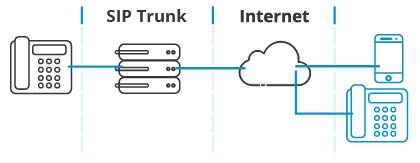When you plan to change your business phone system and plan to keep it on the cloud, your next concern is better for your business- hosted PBX or sip trunking?
Hosted PBX is a cloud-based phone system handled by the service provider, which acts as a third party. At the same time, SIP trunking connects your already available PBX equipment to the internet.
It’s tough to choose between the two, so it is essential to look at all the systems’ angles and then make an informed decision.
What is hosted PBX?
Hosted PBX is a type of phone system wholly taken care of by the third-party service provider and connects directly to the PSTN. The company that uses the hosted PBX solution doesn’t have to maintain the software, equipment, and infrastructure for getting reliable communication.
Benefits of Hosted PBX
- Hosted PBX system includes additional features like conferencing, mobility, etc.
- You don’t have to purchase, upgrade or maintain the PBX equipment.
- High flexibility and scalability
- Unified Business Communications
- Cost Saving
- Minimal equipment is required, only the handsets or gateways.
- Includes voicemail, conference calls, and call recording features.
- Low Initial setup cost
- Long term communication cost will decrease
- You can add various communication features
Disadvantages of Using hosted PBX phone system
- Loss of control over technology
- Low-quality connection
- You have to depend on your service provider for system maintenance
- If you are not the host of your system, you will have access to the limited feature.
What is SIP Trunking?
SIP trunking is a VoIP phone service that connects you with your existing PBX system to the internet. In this service, you can use your existing hardware PBX. Even your current IT staff can manage and install this phone system. SIP trunking connects VOIP and your PBX equipment.
SIP trunking is a very versatile phone system and is a suitable replacement for your traditional landlines. They have advance features like video, emails, other data, and all on the same line.
SIP trunking requires two things-
- An IP enabled PBX
- VOIP gateway to connect the traditional PBX
Benefits of SIP Trunking
- Cost Savings than a traditional phone system
- Scale your call network up and down
- Improved Cost Efficiency
- Call Can be routed to other websites very quickly, which means you have greater flexibility
- Leverage your IP network and turns voice into an application of your network.
- Leverage your existing network for added functionality
- You can diversify your communication using hosted PBX
- You can have complete control over your communication
- Hardware required for sip trunking is less expensive
- You can access your communication from anywhere at anytime
Disadvantages of sip
- Interface congestion potential
- Lack of information security
Things You Should Know About Hosted PBX and SIP trunking.
If you plan to use the hosted PBX, the service provider handles all the technical aspects of your phone service. SIP trunks are given by your vendor, enabling you to make phone calls via an internet connection. Hosted PBX offers flexibility, ability, security, scalability, less price, etc.
-
Initial Cost of Setup of hosted PBX vs. sip trunking
For setting the hosted PBX phone system, all you need is a phone, routers, broadband. In this phone system, you won’t require the servers because that part will be taken care of by your service providers. The initial setup cost is meager, and no hardware is needed, so there won’t be any additional expense.
SIP trunking has more acts of initial setup than hosted PBX. The cost will entirely depend upon the on-premise equipment you already have. The gateway cost, configuration, and installation will be different.
-
The monthly expense and maintenance
Hosted PBX typically provides and offers various range of packages and charges. The packages will vary from one provider to another because some service providers will charge a fee per minute, some will charge per hour, and so on.
SIP trunking service charges per channel with a flat monthly fee. The plans for sip trunking will depend on service providers, and some may even offer two sip trunking plans side by side. One is an unmetered monthly plan that offers unlimited calling but the other consists of a monthly feel with an additional metered rate depending upon the calling minutes.
-
Technical Expertise
While using the hosted PBX phone system, you only require to maintain the changes that occur internally, like adding new users and adding the new features. The service provider handles the server, maintains the software, and handles technical challenges like disruptions, upgrades, outages, and many more.
It will save your additional expense of hiring a technician for maintenance. Even if you are not an expert, you will also be able to make the changes through web based admin system.
You will require an IT team to look after the updates, upkeep, and troubleshooting in sip trunking. It will cost you too much because it will add an extra expense to an IT manager and their team. The IT team or staff is essential because they will understand your on-premise very correctly.
-
Effect on Your Expansion
Hosted PBX is a perfect option for small businesses if they at a single location because you will then afford the high-quality telephony at very affordable rates. If you are expanding with astonishing speed, it is not wise to use the hosted PBX system.
SIP trunking offers VOIP security and flexibility, so it is an excellent option for a company of a bigger size. Even if you plan to open more new offices in multiple locations with remote staff, then SIP trunking will offer you unlimited connectivity by just using one phone number.
SIP trunks will enable you to select the number of channels you will need. With other technology, it is not easy.
-
Geographical Flexibility
When your employees work remotely, they can also use the hosted PBX phone system or even while they are traveling. It is possible because the phone calls are made via the internet. Your staff can also use softphones, VOIP apps, and web phones.
SIP trunking offers this type of flexibility only on a larger scale with unlimited connectivity. Using SIP trunking, you can support your remote as well as mobile workers. Some SIP service providers will equip your office and home phone systems, which will help you receive the calls at your home extension.
-
Call Quality
A reliable phone solution is hosted PBX, which comes with a reliable internet connection. If you don’t have a stable internet connection or outage, it will affect your business. It will leave a very unprofessional impact on your existing customers.
SIP trunking ensures very high call quality. SIP trunks enable you to use the dedicated line or to have a backup connection that you can use whenever an emergency comes. SIP trunking, therefore, offers very high-quality calls. The highest quality call quality and reliability are possible in this phone system.
-
Security
There are few security issues with the hosted PBX phone system because the ports are open, and therefore it defeats the purpose of the firewall. The service providers are in charge of the security and maintaining a complaint related to security.
SIP trunking is very secure; it runs a dedicated connection for you and does not use a public internet connection. Therefore it ensured better security and connectivity. Your sip trunking phone system’s security will depend upon your security policy and how you handle security standards. SIP trunking is very secure than the hosted PBX phone systems.
-
Flexibility
For a hosted PBX system, all phones don’t need to be on the same network, which means that using this phone system offers flexibility. PBX is hosted in the cloud and so anyone from any location can handle this service and even on different devices.
Whereas in SIP trunking, all the phone systems need to be in the same physical proximity. The users of employees can only access this phone system only if they are present in that proximity.
Which one is best- SIP Trunking or Hosted PBX?
Now, as you know the difference between the hosted PBX and sip trunking, you can easily decide which phone system will work best for your business. Both the services have many benefits and many features that can be beneficial for your business at some point.
Most companies choose sip trunking because of the greater flexibility, less cost, efficiency, and fewer service costs. Medium and large enterprises use this service. And if you are a small organization and planning to expand in the future, then hosted PBX will work best for you.
Conclusion
Do more research on both of them and then make a well-infomred decision. It would help if you considered many factors while choosing the business phone system and some of the critical factors we have shared here. Alternatively, you can also consult with your IT staff or network administrators to come to a decision. Your system will get the advantage of sip trunking, and hosted PBX will totally depend on your business infrastructure and the network you are currently using. If you want a cost effective setup with minimum setup cost, then hosted PBX can be a great choice.






